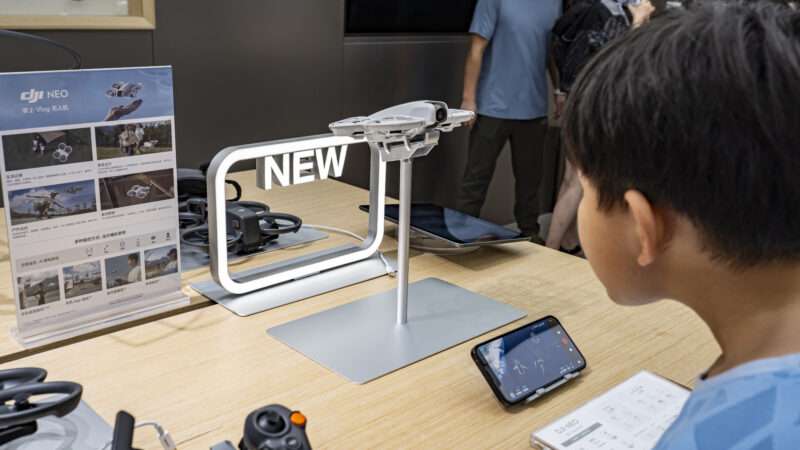
Zheng Wei is a fairly common Chinese name. A tennis player, a movie director, an archaeologist, and multiple Chinese-American academics all share that name. So do an inventor at the consumer drone company DJI and a professor at China's National University of Defense Technology.
And the U.S. government mixed up the last two people, with serious consequences, according to a recent lawsuit by DJI. The drone manufacturer is suing the U.S. Department of Defense for designating DJI as an arm of the Chinese military, and argues that the name mix-up is an example of the Pentagon's sloppy reasoning when imposing economic sanctions.
The Department of Defense designated DJI a "Chinese military company" in 2022, part of a broader protectionist offensive against the drone company. DJI, which is a privately-owned company based in Shenzhen, China, claims that it was unable to figure out why it had been blacklisted. Only after DJI's lawyers announced their intention to sue, the lawsuit says, did the Pentagon provide a report backing up its designation.
The report drew several alleged connections between DJI and Chinese military research institutions, including the fact that Zheng Wei was both an inventor listed on a DJI patent and a professor at the National University of Defense Technology. But DJI provided a sworn declaration by its own Zheng Wei stating that he and the professor are different people.
Similarly, the Pentagon claimed that DJI software engineer Zhang Tao was listed on a patent for a temperature-sensing device designed by China's Military Science Academy. Again, DJI provided a declaration from its own Zhang Tao stating that he is not the same person as the Military Science Academy's Zhang Tao.
"Having employees with common Chinese names is not a basis for listing" someone as a Chinese military company, the lawsuit states, with a footnote linking to an article about anti-Asian racism.
The Pentagon also claimed that the Military Science Academy's invention demonstrated DJI's military links because the military scientists had used a rangefinder sold by DJI to build their device.
"DJI has no control over whether a research university purchases and uses an off-the-shelf DJI product—let alone a product sold by its affiliate—in the development of a patent application," the lawsuit states. "Moreover, DJI products have been frequently used by researchers, including those from the U.S. Air Force. [The Department of Defense's] logic would lead to the conclusion that DJI is also an 'American military company.'"
U.S. sanctions enforcement is a sprawling, Kafka-esque process. Executive agencies can blacklist people or companies with no notice, no right to see the (often thin or specious) evidence, and no chance to appeal. A $31 million lobbying industry has grown around keeping wealthy foreigners off of U.S. sanctions blacklists.
The "Chinese military company" label is a relatively lightweight sanction—it's mostly a prohibition on winning U.S. government contracts—but it has fed into a campaign by the U.S. government and politicians to squeeze DJI products out of the American market. Last month, the House of Representatives unanimously passed a bill that would effectively ban new DJI products from using American radio networks.
Earlier this month, DJI complained that U.S. Customs and Border Protection was holding up its products under the Uyghur Forced Labor Prevention Act, which bans products made in Xinjiang, a region of China where the Chinese government has been trying to forcibly assimilate the Uyghur ethnic group through mass imprisonment.
DJI is not on the U.S. government's blacklist of companies that use Uyghur labor, and the company says that its drones are made in Shenzhen and Malaysia, not Xinjiang. U.S. Customs and Border Protection did not respond to a request for comment.
The U.S. government has accused DJI of supplying the Chinese government with the drones used to spy on Uyghurs. DJI claims that it has "nothing to do with treatment of Uighurs in Xinjiang" and cannot control the ways that governments around the world use its products.
A similar controversy unfolded over the use of DJI drones in the Russian invasion of Ukraine. As it turns out, both the Russian and Ukrainian armies have been using middlemen in other countries to buy DJI drones from retail stores.
"The unfortunate thing is that it's a very reliable product," company spokesman Adam Welsh said in a 2023 interview with CNBC. "So, it's become a product of choice, even for those who want to use a drone inappropriately."
Indeed, DJI supplies almost the entire civilian and police drone market in America. About 90 percent of the hobby drones, 70 percent of the industrial drones, and 80 percent of first responder drones in America are made by DJI.
And that may be exactly why pressure has been building to ban DJI drones. Although some anti-DJI advocates have implied that China could spy on Americans by siphoning data from consumer drones, others have made an explicitly protectionist argument for why drone users should be forced to buy American.
Last year, the Association for Uncrewed Vehicle Systems International, a drone industry organization, complained that Chinese companies were "flooding the U.S. market" with cheap drones "to the detriment of U.S. manufacturing and global competition." Association spokeswoman Chelsie Jeppson told Reason that the lack of a "domestic supply chain" could become a security issue in times of crisis.
In other words, the problem is not that DJI is too compliant with the Chinese government; it's that DJI is not compliant enough with ours.
The post Can the U.S. Government Tell Chinese People Apart? appeared first on Reason.com.







